- Home
- Ian McDonald
Luna Page 2
Luna Read online
Page 2
Bairro Alto changed with every passing lune and Marina wandered far before finding Blake’s room. Apt to share; per diems pooled, read the ad in the Meridian listings.
‘I’m not staying long,’ she said, looking round the single room at the two memory-foam mattresses, the empty plastic water bottles, the discarded food trays.
‘They never do,’ Blake said. Then his eyes bulged and he doubled over into a wracking, sterile cough that shook every rib and spar in his sparse frame. The hacking cough kept Marina awake all that night; three dry, almost petulant little coughs. Then three more. Three more. Three more. The cough kept her awake every subsequent night. It was the song of Bairro Alto: coughing. Silicosis. Moon dust turns lungs to stone. Behind the paralysis comes tuberculosis. Phages treat it easily. People who live in Bairro Alto spend their money on air, water and space. Even cheap phages are a distant hope.
Marina. It’s been so long since her familiar spoke to her that she falls off the ladder in surprise. You have a job offer. The fall is a handful of metres; nothing in this crazy gravity. She still has flying dreams: in them she is a wind-up bird orbiting a clockwork orrery. An orrery spinning in a stone cage.
‘I’ll take it.’
It’s catering.
‘I cater.’ She’ll do anything. She scans the contract. She’s bid herself low, but the offer is barely adequate. It’s her air-water-carbon-network, and a little more. There’s an up-front payment. She’ll need a new uniform from the printers. And a bath in a banya. She can smell her hair. And a train fare.
She has an hour to be in Central Station. Marina blinks up a signature. The contact lens scans and transmits her retinal pattern to the agency. Familiars handshake and there is money in her account. The joy is so sharp it hurts. The might and magic of money is not what it allows you to own; it is what it allows you to be. Money is freedom.
‘Take it up,’ she says to Hetty. ‘Restore defaults.’
Instantly the tightness in her lungs releases. Exhaling is wonderful. Inhaling is an exaltation. Marina savours the Meridian perfume: electricity and gunpowder and sewage tang and mould. And when she gets to where the breath should end, there is more. She draws deep.
But time is tight. To make the train she will have to take the West 83rd elevator, but that is in the opposite direction to Blake’s place. Elevator or Blake? There is no decision.
Again Lucasinho wakes. He tries to sit up and pain drives him down on to the bed. He aches as if every muscle in his body has been pulled away from its bone or joint and that space filled with ground glass. He lies on a bed, dressed in a pressure skin, the same kind he would wear for a sane, safe, ordinary walk on the surface. He can move his arms, his hands. His fingers walk up and down his body, stocktaking. The abs, the armour of muscle across his belly, his thighs tight and defined. His ass feels fabulous. He wishes he could touch his skin. He needs to know his skin is good. He is famous for his skin.
‘I feel like shit. Even my eyes hurt. Am I getting drugs?’
The mu-opioid clusters in your Periaqueductal grey are under direct stimulation, says a voice inside his head. I can adjust the input.
‘Hey Jinji you’re back.’ No mistaking the picky, butlerish speech of his familiar. Familiars have problems with ambiguity. He’s aware of the chib in the bottom right corner of his vision. Cortas don’t need to notice those numbers but he’s glad to see it. The chib tells him he’s alive, aware, consuming. ‘Where am I?’
You’re in the Sanafil Meridian medical facility, Jinji says. You’ve been moved from a hyperbaric chamber to a compression skin. You’ve been in a series of medically induced comas.
‘How long?’ He tries to sit upright. Pain tears along every bone and joint. ‘My party!’
It’s been rescheduled. You’re due another induced coma now. Your father is coming to see you.
White articulated medical arms unfold from the walls.
‘Wait, no. I saw Flavia.’
Yes. She came to visit you.
‘Don’t tell him.’
He has never understood why his father banished his madrinha, his host-mother, from Boa Vista the morning of Lucasinho’s sixteenth birthday. He just knows that if Lucas Corta learns that Madrinha Flavia has been here, his father will hurt her with a hundred spitefulnesses.
I won’t, says Jinji.
A third time Lucasinho wakes. His father stands at the foot of the bed. A short man, slight; dark and haunted as his older brother is broad and golden. Poised and polished, a pencil line of moustache and beard, no more; perfect but always scrutinising to keep that perfection: his clothes, his hair, his nails are immaculate. A cool, judging man. Above his left shoulder hovers Toquinho. His familiar is an intricate knot of musical notes and complex chords that occasionally resolves into half-heard, whispered bossa-nova guitar.
Lucas Corta applauds. Five clear claps.
‘Congratulations. You’re a Runner now.’ It’s known inside the family and out that Lucas Corta never made the moon-run. The reason is his secret: Lucasinho has heard that people who pry are punished, badly. ‘Emergency room team; ophthalmics, pneumothoracic specialists; hire of hyperbaric chamber, hire of pressure skin, O2 charges …’ his father says. Lucasinho swings off the bed. The medical bots have removed the pressure skin. The white walls open around him; robot arms unfold with offers of fresh-printed clothing. ‘Transfer from Meridian to João de Deus …’
‘I’m at João de Deus?’
‘You’ve a party to go to. A homecoming for a hero. Make an effort. And try to keep your cock out of someone for five minutes. Everyone’s here. Even Ariel’s managed to tear herself away from the Court of Clavius.’
Before anything else: the essentials. Metal studs and spikes slip into the careful holes in his flesh – each one the record of a heartbreak. Jinji shows Lucasinho himself so he can comb up the quiff to its full low-gravity magnificence; a deep-sea wave of glossy thick hair. Killer cheekbones and you could breaks rocks on his belly. He’s taller than his father. Everyone in this generation is taller than the second-generations. He is so freakin’ hot.
‘He’ll live,’ Lucas says.
‘Who?’ Lucasinho hesitates between shirts before choosing the soft brown marl pattern.
‘Kojo Asamoah. He has twenty per cent second-degree burns, ruptured alveoli, burst blood vessels, brain lesions. And the toe. He’ll be all right. There’s a delegation of Asamoahs waiting at Boa Vista to thank you.’
Abena Asamoah might be there. Maybe she would be so thankful she would let him fuck her. Tan pants with two-centimetre turn ups and six pleats. He snaps the belt shut. Spider-silk socks and the two-tone loafers. It’s a party so a sports jacket will be right. He picks the tweed, feels the prickle of the fibres between thumb and fingers. That’s animal-stuff, not printed. Insanely-expensive animal stuff.
‘You could have died.’
As Lucasinho slips the jacket on, he notices the pin on the lapel: Dona Luna, the sigil of the moon-runners. The patron saint of the moon: Our Lady of Life and Death, Light and Dark, one half of her face a black angel, the other a naked white skull. Lady Two-Face. Lady Moon.
‘What would the family have done then?’
How did his father know he’d pick the jacket with the pin on it? Then the arms take the rest of the clothing into the walls and he notices that every jacket has a Dona Luna pin on it.
‘I’d have left him, if it had been me.’
‘It wasn’t you,’ Lucasinho says. Jinji shows Lucasinho the total effect of his choices. Smart but not formal, casual but classy and on the season’s trend, which is European 1950s. Lucasinho Corta adores clothes and adornment. ‘I’m ready for my party now.’
‘I’ll fight you.’
Ariel Corta’s words carry clear across the court. And the room erupts. The defendant bellows: you can’t do that. The defence counsel thunders abuse of process. Ariel’s legal team – they are seconds now that the trial by combat has been agreed – plead, cajole, shout that this
is insane, Alyaoum’s zashitnik will cut her apart. The public gallery is in uproar. Court journalists clog the bandwidth as they stream live feed.
A routine post-divorce custody settlement has turned into the highest drama. Ariel Corta is Meridian’s – and therefore the moon’s – leading marriage lawyer, both making and breaking. Her nikah contracts touch every one of the Five Dragons, the moon’s great dynasties. She arranges marriages, negotiates terminations, finds loopholes in titanium-bound nikahs, bargains buy-outs and settles swingeing alimonies. The court, the public gallery, the press and social commentators and court fans, have the highest expectations for Alyaoum vs Filmus.
Ariel Corta does not disappoint. She peels off the gloves. Kicks off the shoes. Slips off the Dior dress. In sheer capri tights and a sports top, Ariel Corta stands before the Court of Clavius. Ariel claps Ishola her zashitnik on the back. He is a broad, bullet-headed Yoruba, a kindly man and a brutal fighter. Joe Moonbeams – new immigrants – with their Earth muscle mass, make the best courtroom fighters.
‘I’ll take this one, Ishola.’
‘No senhora.’
‘He won’t lay a finger on me.’
Ariel approaches the three judges.
‘There is no objection to my challenge?’
Judge Kuffuor and Ariel Corta have old history; teacher and pupil. On her first day in law school he taught her that Lunar law stands on three legs. The first leg is that there is no criminal law, only contract law: everything is negotiable. The second is that more law is bad law. The third leg is that a fly move, a smart turn, a dashing risk is as powerful as reasoned argument and cross-examination.
‘Counsel Corta, you know as well as us that this is the Court of Clavius. Everything may be tested, including the Court of Clavius,’ Judge Kuffuor says.
Ariel purses the fingers of her right hand and dips her head to the judges. She turns to face the defendant’s zashitnik down in the pit. He is muscle and scars, the veteran of a score of trials that have gone to combat, already beckoning her to come on, come down, come into the fighting pit.
‘So let’s fight.’
The courtroom roars approval.
‘First blood,’ shouts Heraldo Muñoz, Alyaoum’s counsel.
‘Oh no,’ roars Ariel Corta. ‘Death, or nothing.’
Her team, her zashitnik are on their feet. Judge Nagai Rieko tries to make herself heard over the tempest of voices. ‘Counsel Corta, I must caution you …’ Through the tumult, Ariel Corta stands poised, powerful, the calm at the heart of the storm of voices. Counsels for the defence confer, heads dipped, eyes flashing towards her and then back to their fast, low talk.
‘If the court please.’ Muñoz is on his feet. ‘The defendant withdraws.’
Not a breath is taken in Courtroom Three.
‘Then we find for the plaintiff,’ says Judge Zhang. ‘Costs against the defendant.’
A third time the court erupts and this time is the loudest of all. Ariel drinks down the adulation. She makes sure the cameras get every angle. She slides her long, slender titanium vaper out of her bag, snaps it to length, locks and lights and exhales a thin stream of white mist. She slings her jacket over her shoulder, hooks her shoes on a finger and stalks out of the court in her fighting gear. The applause, the faces, the hovering cloud of familiars: she devours them. All trials are theatre.
An outside view costs; entertainment costs even more so Marina sits in her bottom deck, centre-section seat and makes faces at the kid peeking at her between the headrests. It’s only an hour by high-speed train from Meridian to João de Deus. Amusing a kid is entertainment enough. This is the first time Marina has been out of Meridian. She’s on the moon. She’s on the surface of the moon, racing across it on magnetic rails at a thousand kilometres per hour, and she’s blind inside a metal tube. Plains and crater rims and rilles and escarpments. Great mountains and vast craters. All out there, beyond this warm, jasmine-scented, pastel-coloured, chattery interior. All grey and dusty. All the same, all short of magnificence. She’s missing nothing.
Hetty has full network access so when the kid is told to quit bothering the lady in the row behind, Marina passes the time with music and pictures. Her sister has uploaded new family photographs. There’s her new niece, and her old nephew. There’s brother-in-law Arun. There’s her mother, in the chair, with the tubes in the backs of her hands. She’s smiling. Marina’s glad she can’t see the airless mountains, the harsh empty seas. Against the treasury of leaves, the soft dove skies, the sea so green and full she could almost smell its depth; the moon would look like a white skull. In this train Marina can pretend she’s home on Earth and she will step out among the trees and volcanoes of Cascadia.
Mom starts a new course Tuesday. Kessie would never openly beg for money but the ask is there. Mom’s medical bills sent Marina to the moon. The Big Boom on the Moon! Everyone has their hands out. Everyone, every second of every day. Marina bites back the anger. It’s not the lunar way. If everyone acted how they felt, the cities would be morgues by nightfall.
The train slows into João de Deus. Passengers collect belongings. Hetty’s instructions are to present to security on Platform 6, from which the private tram will take her to the site. Marina feels a kick of excitement; for the first time she’s thought about what lies at the end of that private line: Boa Vista, the legendary garden-palace of the Cortas.
Outside Courtroom Three the entourage descends. Ariel Corta is never without admirers, clingers, potential clients, potential suitors of all genders. Attractive is the first thing people say about Ariel. The Cortas have never been deep beauties but no Brazilian has ever been ugly and every child of Adriana commands the eye with some grace. Ariel’s attraction is her bearing; she carries herself with poise and assurance, a cool confidence. Attention flows to her. Her colleague Idris Irmak pushes through the kisses and congratulations.
‘You could have died in there.’
Insect-sized cameras swarm above Ariel’s head.
‘No I couldn’t.’
‘He would have cut you open.’
‘You think?’
Ariel’s hands move and grip Idris’s forearm. She locks his elbow. Her slightest pressure will pop the joint like a bottle cap. The entourage gasps. The cameras dart lower for a tighter angle. This is sensational. The gossip webs will be squealing for days. And release. Idris shakes out his agonised hand. All Corta children are taught Gracie jiu jitsu. Adriana Corta believes that every child should know a fighting art, play a musical instrument, speak three languages, read an annual report and dance a tango.
‘He’d have cut me to ribbons. Do you think I would have risked it if I didn’t know Muñoz would capitulate?’
Idris spreads his hands. Explain the trick.
‘The Alyaoums were clients of the Mackenzies until Betake Alyaoum insulted Duncan Mackenzie by not marrying Tansy Mackenzie,’ Ariel says. The entourage dotes on her words. ‘The Mackenzies withdrew their support. Without it: if Alyaoum had so much as scratched me, it would have been vendetta with the Cortas, without House Mackenzie behind them. They couldn’t risk that. All the way I was forcing a trial by combat, knowing they had to concede.’ She stops at the door of the Counsel Room to address the entourage. ‘Now if you’ll excuse I have a moon-run party for my nephew and I simply can’t go like this.’
Judge Nagai and a bottle of ten-botanical gin wait for Ariel in the Counsel Room.
‘Pull a trick like that in my court again, and I will order the zashitniks to gut you,’ the judge says. She’s perched on the edge of the washbasin. Counsel chambers are small and stuffy.
‘But that would be clear dereliction of due diligence,’ Ariel says. She dumps her armful of business suit into the deprinter. The hopper swallows it and reduces the fabric to organic feedstock. Beijaflor, Ariel’s familiar, has already picked out her party frock: a 1958 Balenciaga, shoulder straps, asymmetric cut, black floral print on deep grey. ‘The court failing to protect the interests of a contracted party?�
��
‘Why can’t you just mine helium like your brothers?’
‘They’re such dull boys.’ Ariel kisses her on each cheek. ‘Lucas has a negative sense of humour.’ Ariel studies the gin: a gift from her client. ‘Custom printed. What a nice touch.’ She tips the bottle towards Judge Nagai. A shake of the head. Ariel fixes herself a martini, blisteringly dry.
Rieko touches her left forefinger between her eyes: the accepted gesture to speak without familiars. Ariel blinks Beijaflor away: a half-seen hummingbird, a spray of iridescence constantly changing hue to match Ariel’s fashion. Rieko’s familiar, a blank sheet constantly folding itself into new origami models, blinks out.
‘I’ll not keep you,’ Judge Nagai says. ‘To be brief, you may be unaware that I am a member of the Pavilion of the White Hare.’
‘What’s it they say? Anyone who says they’re a member of the White Hare—’
‘—isn’t,’ Judge Nagai finishes the aphorism. ‘There’s an exception to every generality.’
Ariel Corta takes a debonair sip of her martini but every sense is alert and vibrant. The Pavilion of the White Hare, the council of advisers to the Eagle of the Moon, inhabits a place between myth and truth. It exists, it could not possibly exist. It hides in plain sight. Its members confirm and deny their membership. Ariel Corta does not need Beijaflor to tell her her heart rate has increased, her breath quickened. It takes all her concentration to keep her excitement from rippling across the surface of her martini.

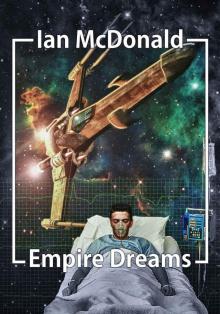 Empire Dreams
Empire Dreams The Menace from Farside
The Menace from Farside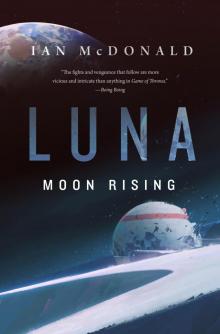 Luna: Moon Rising
Luna: Moon Rising Moon Rising
Moon Rising Desolation Road dru-1
Desolation Road dru-1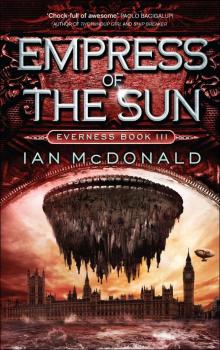 Empress of the Sun
Empress of the Sun Ares Express dru-2
Ares Express dru-2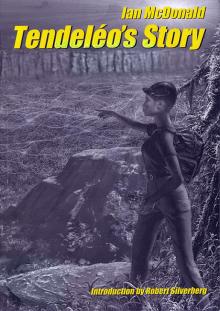 Tendeléo’s Story
Tendeléo’s Story River Of Gods
River Of Gods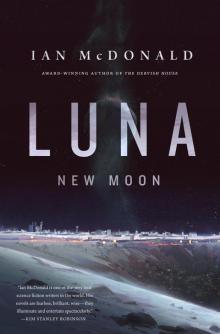 Luna
Luna![Cyberabad Days - [River of Gods 02] Read online](http://i1.bookreadfree.com/i1/03/29/cyberabad_days_-_river_of_gods_02_preview.jpg) Cyberabad Days - [River of Gods 02]
Cyberabad Days - [River of Gods 02]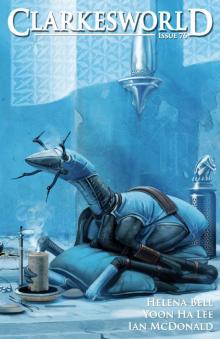 Clarkesworld Magazine Issue 76
Clarkesworld Magazine Issue 76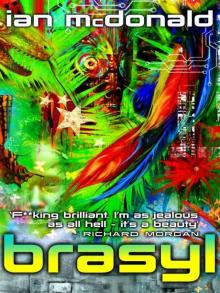 Brasyl (GollanczF.)
Brasyl (GollanczF.)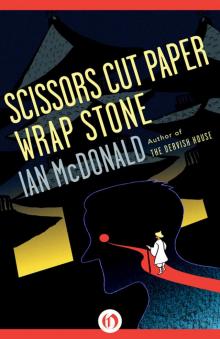 Scissors Cut Paper Wrap Stone
Scissors Cut Paper Wrap Stone Chaga
Chaga Time Was
Time Was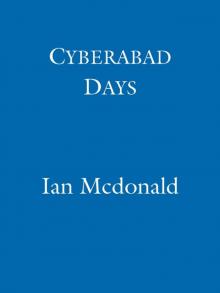 Cyberabad Days
Cyberabad Days Be My Enemy
Be My Enemy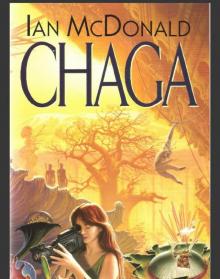 Changa
Changa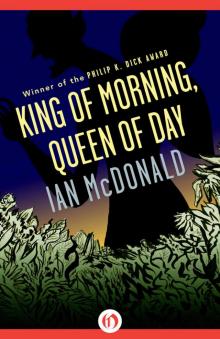 King of Morning, Queen of Day
King of Morning, Queen of Day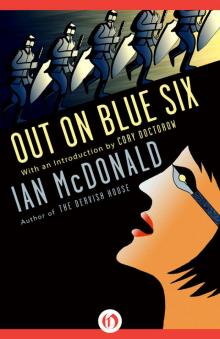 Out on Blue Six
Out on Blue Six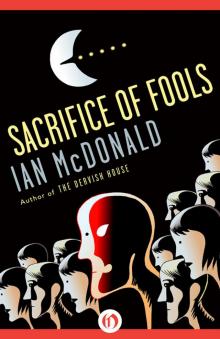 Sacrifice of Fools
Sacrifice of Fools Desolation Road
Desolation Road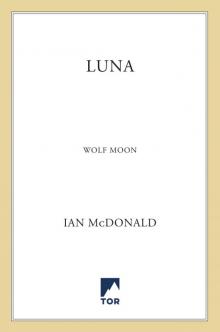 Luna--Wolf Moon--A Novel
Luna--Wolf Moon--A Novel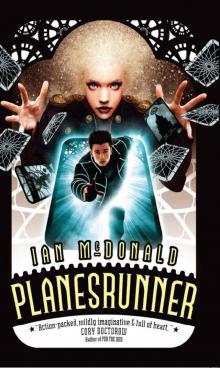 Planesrunner (Everness Book One)
Planesrunner (Everness Book One) Ares Express
Ares Express